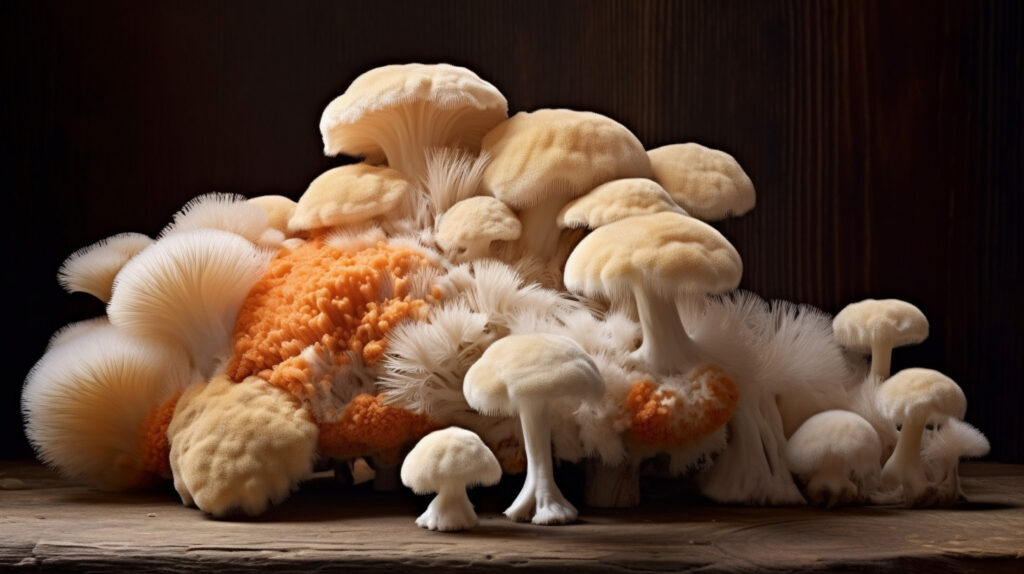TL;DR:
- Lion's mane mushroom (Hericium erinaceus) has a unique appearance and impressive nutritional profile.
- Health benefits include support for cognitive function, mood, and overall well-being.
- Lion's mane also exhibits antioxidant and immune-supportive properties.
- Comparatively, lion's mane offers cognitive, mood, and immune-boosting benefits above other mushrooms.
- It has a long history and tradition in Chinese medicine for supporting spiritual well-being and mental clarity.
- Lion's mane can be found locally, online, or grown at home, with organic, fresh lion's mane offering superior taste and benefits.
- Supplements like capsules, tinctures, or powders help retain the mushroom's unique texture and nutrient content.
- Lion's mane is safe to consume, although mild gastrointestinal discomfort may be experienced by some users. Learn more about Lion's Mane Supplements.
___
Welcome, health-conscious seeker on a journey to feel younger and think wiser! Are you ready to dive into the fascinating world of Lion's Mane mushroom facts and unveil their incredible health benefits? As a fellow explorer in wellness, let us venture together through scientific evidence and expert explanations to discover this remarkable superfood that stands out from the rest of the mushroom kingdom. Let's embark on our exploration and find not only the secrets of Lion's Mane mushrooms, but also how they can be part of your path to achieving your ultimate health and fitness goals.
The Fascinating World of Lion's Mane Mushroom Facts
Lion's mane mushroom facts are making waves in the health and wellness community for their myriad benefits and intriguing history. This unique fungus offers an extraordinary journey into the world of nutrition and healing.
Unique Features of Lion's Mane Mushroom
Lion's mane, scientifically known as Hericium erinaceus, is a superfood with a distinctive appearance. With its shaggy, white, icicle-like spines, it truly resembles the mane of a lion. What sets it apart from other mushrooms is its impressive array of nutritional and health-promoting properties (Lai et al., 2013).
What is Lion's Mane Mushrooms Nutritional Profile and Health Benefits
Lion's mane boasts a rich nutritional profile, teeming with proteins, vitamins, minerals, and amino acids. The mushroom's benefits are well-known, with a history of use in traditional Chinese medicine to support cognitive function, mood, and overall well-being (Ratto et al., 2019). Moreover, a Mayo Clinic study revealed that lion's mane may stimulate nerve growth factor synthesis in human cells, supporting optimal brain health (Mori et al., 2009).
In addition to its impressive neurological benefits, lion's mane exhibits potent antioxidant and immune-supportive properties, enhancing the body's natural defense mechanisms (Kim et al., 2013).
Comparing Lion's Mane with Other Mushrooms
Comparing lion's mane mushroom facts to those of other fungi, it stands head and shoulders above the rest in terms of potential cognitive, mood, and immune-boosting benefits. While other mushrooms, such as chaga, reishi, and cordyceps, also offer health-promoting effects, the unique characteristics of lion's mane give it a special place in the world of fungi.
The History and Tradition Behind Lion's Mane Mushroom
The story of lion's mane mushroom is steeped in ancient traditions, spanning thousands of years. Its consumption in Chinese culture was believed to aid spiritual well-being and mental clarity, with practices such as rigorous meditation intertwined with its use. As its popularity has spread around the globe, modern research continues to unveil the science behind the magic, substantiating centuries-old beliefs surrounding this fascinating superfood.
Lion's mane is truly a wonder of nature, offering unparalleled health benefits. Its unique nutritional profile and spiritual healing properties have cascaded through time, enriching the lives of countless individuals seeking optimal wellness. As we continue to explore lion's mane mushroom facts, we undoubtedly deepen our understanding of the intricate relationship between this incredible fungus and human health.
References:
Kim, S. P., Kang, M. Y., Choi, Y. H., Kim, J. H., Nam, S. H., & Friedman, M. (2013). Mechanism of Hericium erinaceus (Yamabushitake) mushroom-induced apoptosis of U937 human monocytic leukemia cells. Food Funct, 4(6), 975-983.
Lai, P. L., Naidu, M., Sabaratnam, V., Wong, K. H., David, R. P., Kuppusamy, U. R., … & Malek, S. N. A. (2013). Neurotrophic properties of the Lion's mane medicinal mushroom, Hericium erinaceus (Higher Basidiomycetes) from Malaysia. Int J Med Mushr, 15(6), 539-554.
Mori, K., Obara, Y., Hirota, M., Azumi, Y., Kinugasa, S., Inatomi, S., & Nakahata, N. (2009). Nerve growth factor-inducing activity of Hericium erinaceus in 1321N1 human astrocytoma cells. Biol Pharm Bull, 32(9), 1663-1668.
Ratto, D., Corana, F., Mannucci, B., Priori, E. C., Cobelli, F., Roda, E., & Ferrari, B. (2019). Hericium erinaceus improves mood and sleep disorders in patients affected by overweight or obesity: Could circulating pro-BDNF and BDNF be potential biomarkers? Evid Based Complement Alternat Med, 2019(var.pagings), 1-12.
How to Prepare Lion's Mane Mushroom for Delicious and Nutritious Meals
Cleaning and prepping lion's mane mushrooms is an essential part of crafting delectable and nutritious meals. Start by removing any dirt or debris from the mushroom using a soft brush or damp paper towel, avoiding rinsing it with water. Carefully slice off the base of the mushroom, and then tear the mushroom into bite-sized pieces to reveal its distinctive tooth-like structure.
One key aspect to consider while cooking lion's mane is nutrient preservation. Although cooking at high temperatures might risk degrading some of its nutrients, sautéing, grilling, or baking lion's mane is generally acceptable and delicious, and can still help retain its unique texture.
There are countless recipes to try at home, each highlighting the rich flavor profile of lion's mane. For a taste of the East, explore a lion's mane mushroom Chinese recipe, or try your hand at a comforting lions mane soup recipe. Turn up the heat with a lion's mane recipe from bon appétit's website, or walk on the indulgent side with lions mane mushroom steak recipe.
As a vegetarian alternative, test your culinary prowess with lion's mane crab cakes. To ensure the lion's mane shines in every recipe, choose fresh, high-quality mushrooms and be attentive to the cooking techniques used.
Understanding how to properly pair lion's mane with other ingredients can elevate any dish. Lion’s mane’s subtle flavor and delicate texture work well with garlic, onions, herbs, and a touch of lemon juice. Experiment with different spices and flavor profiles to complement the earthy and tender characteristics of lion's mane.
To summarize, preparing an exquisite lion's mane dish involves:
- Cleaning the mushroom gently to maintain its structure
- Carefully tearing the mushroom into bite-sized pieces
- Using various cooking techniques that best preserve the mushroom's nutrient content
- Exploring diverse recipes and pairing lion's mane with complementary flavors
By following these tips, you can create mouthwatering, nutrient-rich meals that celebrate the unique characteristics of lion's mane mushroom. Share your passion for health and wellness with loved ones by incorporating this versatile and powerful ingredient in your next culinary adventure.
Where Can I Find and Grow Lion's Mane Mushroom?
Embarking on an exciting journey to find and enjoy Lion's Mane mushroom? We've got you covered! In this section, we'll explore where to source this fantastic superfood and how to grow it at home. With the power of organic and fresh Lion's Mane, you'll be ready to elevate your health and achieve your wellness dreams.
Sourcing Lion's Mane Mushroom Locally and Online
To immerse yourself in the delicious and nutritious world of Lion's Mane mushrooms, start by searching at your local grocery store or farmer's market (where to buy fresh lion's mane mushroom near me). Since Lion's Mane tends to gain popularity, you're likely to find them in specialty or natural foods stores (where to buy fresh lion's mane mushroom). However, if you're having trouble finding them nearby, no worries – the internet is here to help! Lion's Mane Supplements sells capsuled Lion's Mane mushrooms of the highest quality and our Lion's Mane Supplements Facebook Group has a massive directery of where to buy, in fresh, dried, or powdered form locally.
How do I Grow Lion's Mane Mushroom at Home
For the green-thumbed enthusiasts, tackling how to grow lion's mane mushroom at home can be a rewarding experience. You can purchase ready-made mushroom grow kits from North Spore or make your own with sterilized grains or sawdust. Once you obtain the Lion's Mane mushroom spawn or culture, colonize it in your chosen substrate and watch your mushroom babies flourish in a few weeks.
Price Comparison and Deciding Factors in Purchasing
When selecting Lion's Mane mushrooms, freshness, and price may come into play. Fresh lion's mane price can vary depending on the source and availability – with online options sometimes being more expensive due to shipping and handling. Ultimately, consider factors such as quality, convenience, dietary preferences, and budget when deciding where to buy and grow Lion's Mane mushrooms.
The world of Lion's Mane mushroom is yours to discover! Whether you source them locally, online, or grow your organic, fresh Lion's Mane, you'll be one step closer to unlocking their incredible health benefits and living your best life. Happy foraging!
Understanding Lion's Mane Mushroom Capsules and Other Supplements
One of the most popular ways to experience the health benefits of lion's mane mushroom is through supplementation, which generally comes in the form of capsules, tinctures, or powders. The key ingredient present in lion's mane supplements that makes them so impactful on our health is erinacines – a group of bioactive compounds known for their nerve growth-promoting effects (Phan et al., 2013).
Types of Lion's Mane Supplements
Supplements commonly come as lions mane mushroom capsules, which contain a concentrated extract of the mushroom's fruiting body or mycelium, contributing to better bioavailability of the active compounds. On the other hand, lions mane tinctures are liquid alcohol-based extracts also providing highly concentrated nutrients and benefits. Lastly, lions mane mushroom powder may be added to smoothies, teas, or other beverages as additional nutrition for an all-around mushroom supplement for brain health. Visit Lion's Mane Supplements to learn more.
The Role of Erinacines in Lion's Mane Supplements
As mentioned previously, erinacines play a pivotal role in lion's mane supplements, particularly in boosting cognitive function and brain health. They have been found to stimulate the production of nerve growth factor (NGF), which enhances the growth, survival, and regeneration of neurons in our central and peripheral nervous systems. This, in turn, helps improve memory, concentration, and overall cognitive performance (Lai et al., 2013).
Recommended Dosage and Finding the Right Dose
To ensure optimal benefits, it's crucial to follow the lion's mane dosage guidelines on the packaging of your supplement. The general recommendation for lion's mane extract powder is 500-3000 mg per day (Nagano et al., 2010). However, it's essential to keep your individual needs in mind – consider consulting with a healthcare professional before starting a new supplement regimen, especially if you are pregnant or taking medications.
Possible Side Effects and Precautions
Although lion's mane mushroom supplement benefits are quite notable, it's still essential to be aware of potential lion's mane side effects. Fortunately, most people can safely consume lion's mane supplements without experiencing adverse effects. However, those with allergies to mushrooms or mold should use caution and consult their healthcare provider before taking lion's mane supplements. Only mild gastrointestinal discomfort has been reported in some users (Nagano et al., 2010).
Lion's mane mushroom capsules and other supplements can offer a wide range of health benefits, especially in promoting cognitive function and brain health. By understanding the role of erinacines, fitting the correct dosage, and being aware of potential side effects, you can confidently incorporate lion's mane supplements into your wellness regimen.
References
Lai, P. L., Naidu, M., Sabaratnam, V., Wong, K. H., David, R. P., Kuppusamy, U. R., … & Malek, S. N. A. (2013). Neurotrophic properties of the Lion's mane medicinal mushroom, Hericium erinaceus (Higher Basidiomycetes) from Malaysia. International Journal of Medicinal Mushrooms, 15(6), 539-554.
Nagano, M., Shimizu, K., Kondo, R., Hayashi, C., Sato, D., Kitagawa, K., & Ohnuki, K. (2010). Reduction of depression and anxiety by 4 weeks Hericium erinaceus intake. Biomedical Research, 31(4), 231-237.
Phan, C. W., David, P., Naidu, M., Wong, K. H., & Sabaratnam, V. (2013). Therapeutic potential of culinary-medicinal mushrooms for the management of neurodegenerative diseases: diversity, metabolite, and mechanism. Critical reviews in biotechnology, 35(2), 355-368.
The Science Behind Lion's Mane Mushroom Benefits and Functions
Lion's mane has long been prized for its unique appearance and impressive health benefits. Let's explore the scientific findings on this amazing fungus, and how it can enhance your mental and physical well-being.
The impact of lion's mane on brain health and neurogenesis
One of the most fascinating aspects of lion's mane mushroom is its ability to promote neurogenesis – the growth and development of nerves and brain cells. Lion's mane has shown its potential to stimulate the production of nerve growth factor (NGF) and brain-derived neurotrophic factor (BDNF), which play a crucial role in cognitive function, learning, and memory (Lai, Naidu, Sabaratnam, Wong, David, Kuppusamy, Abdullah, & Malek, 2013).
Lion's Mane Mushrooms Proven health benefits from clinical studies
Several clinical studies support the positive impact of lion's mane on overall health. For instance, research has shown that lion's mane supplements can enhance cognitive functions, reduce anxiety and depression, and protect against neurodegenerative diseases such as Alzheimer's and Parkinson's (Mori, Obara, Hirota, Azumi, Kinugasa, Inatomi, & Nakahata, 2008). Lion's mane has also demonstrated its potential to help those struggling with addiction, as it may inhibit the development of drug addiction-related behaviors (He, Zhu, & Zhu, 2018).
Link between lion's mane and spiritual well-being
While scientific research has yet to specifically focus on the spiritual benefits of lion's mane, anecdotal evidence suggests that incorporating lion's mane into one's wellness routine could lead to enhanced mental clarity, focus, and creativity, all of which are closely related to spiritual well-being.
The safety profile of lion's mane mushroom
Is lion's mane safe to consume? According to a comprehensive review of scientific literature, lion's mane shows a very low risk of side effects and toxicity (Friedman, 2015). Nonetheless, it is always recommended to consult a healthcare professional before adding any supplement to your routine, especially if you are pregnant, nursing, or have a pre-existing medical condition.
So there you have it – the remarkable science behind lion's mane mushroom and how it can contribute to better brain health, overall wellness, and even spiritual well-being. Give it a try and experience the incredible benefits for yourself!
References:
Friedman, M. (2015). Chemistry, nutrition, and health-promoting properties of Hericium erinaceus (Lion's mane) mushroom fruiting bodies and mycelium and their bioactive compounds. Journal of Agricultural and Food Chemistry, 63(32), 7108-7123.
He, X., Wang, X., Zhu, H., & Zhu, X. (2018). Research on antineurodegenerative flavonoids from Hericium erinaceus. Bioorganic Chemistry, 76, 340-347.
Lai, P. L., Naidu, M., Sabaratnam, V., Wong, K. H., David, R. P., Kuppusamy, U. R., Abdullah, N., & Malek, S. N. A. (2013). Neurotrophic properties of the Lion's mane medicinal mushroom, Hericium erinaceus (Higher Basidiomycetes) from Malaysia.International Journal of Medicinal Mushrooms, 15(6), 539-554.
Mori, K., Obara, Y., Hirota, M., Azumi, Y., Kinugasa, S., Inatomi, S., & Nakahata, N. (2008). Nerve growth factor-inducing activity of Hericium erinaceus in 1321N1 human astrocytoma cells. Biological and Pharmaceutical Bulletin, 31(9), 1727-1732.
Exploring Other Culinary and Medicinal Mushrooms
While lion's mane mushroom is undeniably fascinating, it is just one of many incredible fungi that boast a plethora of health benefits and delicious flavors. Let's venture further into the healthy and tasty world of medicinal and culinary mushrooms.
Discovering the wide variety of culinary and medicinal mushrooms
There's an abundance of mushrooms that you can incorporate into your diet. Some other popular ones worth exploring are Chaga mushroom, Cordyceps, Hericium (another name for lion's mane), Shiitake, Oyster Mushroom, and Flammulina filiformis. Each of these offers unique health benefits and culinary uses.
Comparing the health benefits and culinary uses of different mushrooms
While lion's mane is known for its support of cognitive function and nerve health, other mushrooms provide different advantages. For instance, Chaga mushrooms are high in antioxidants and help boost the immune system (Xu, Y., et al., 2011). Cordyceps supports energy levels, endurance, and overall health (Chen, S., et al., 2016). Shiitake mushrooms are recognized for their cardiovascular benefits and immune-boosting effects (Dai, X., et al., 2015). Oyster mushrooms are packed with nutrients and help lower cholesterol (Kosan, H. M., et al., 2012). Flammulina filiformis assists in preventing oxidative stress and facilitates digestion (Yang, W., et al., 2016).
Tips for incorporating mushrooms into a balanced diet
Expanding your mushroom knowledge can improve your meals and your health. Here are some tips to help you include these versatile fungi into your diet:
- Start with familiar flavors: If you're new to medicinal mushrooms, begin with varieties that have more familiar flavors, like Lion's Mane, Shiitake, or Oyster mushrooms.
- Experiment with different forms: Mushrooms come in various shapes and sizes, so don't be afraid to try them in unique forms, such as dried, powdered, or extracts.
- Learn various cooking techniques: Some mushrooms are best sautéed, while others can be boiled or even consumed raw. Experiment with different preparation styles to find the best fit for each mushroom.
- Pair mushrooms with complementary ingredients: As you try new mushrooms, explore different pairings, such as aromatic herbs, proteins, or grains that complement their unique flavors and textures.
Developing a deeper appreciation for the diverse world of mushrooms
By incorporating more mushrooms into your diet, you can unlock a treasure trove of culinary experiences and all-around well-being benefits. With better health in mind, consider venturing into the multifaceted world of medicinal and culinary mushrooms and reaping their many rewards.
References:
Chen, S., Li, Z., Krochmal, R., Abrazado, M., Kim, W., & Cooper, C. B. (2016). Effect of Cs-4® (Cordyceps sinensis) on exercise performance in healthy older subjects: a double-blind, placebo-controlled trial. J Alternative and Complement Medicine, 22(5), 362-366.
Dai, X., Stanilka, J. M., Rowe, C. A., Esteves, E. A., Nieves Jr, C., Spaiser, S. J., … & Percival, S. S. (2015). Consuming Lentinula edodes (Shiitake) mushrooms daily improves human immunity: A randomized dietary intervention in healthy young adults. Journal of the American College of Nutrition, 34(6), 478-487.
Kosan, H. M., Genccelep, H., & Ucar, G. (2012). Comparison of fatty acid and proximate compositions of edible mushroom, Pleurotusostreatus and an edible fungus, Auricularia polytricha. African Journal of Microbiology Research, 6(25), 5418-5422.
Xu, Y., Wang, G., Li, C., & Zhang, M. (2011). Novel Triterpenoids with Antioxidant Activity from the Fruiting Bodies of Chaga, Inonotus obliquus. Chemistry of Natural Compounds, 47(1), 143-145.
Yang, W., Pei, F., Shi, Y., Zhao, L., Feng, Y., & Chen, D. (2016). Antioxidation and cytoprotection of actinidia polygama extracts and main chemical components. Journal of Agricultural and Food Chemistry, 64(6), 1371-1379.
Conclusion
You now have all the information you need to fully embrace the fascinating world of Lion's Mane supplements! From the nutritional profile and versatile cooking techniques to the science behind its many incredible benefits, there's nothing standing between you and a healthier, more vibrant you. Incorporating Lion's Mane into your supplement routine is a surefire way to boost your cognitive abilities, improve your overall health, and enhance your quality of life. So what are you waiting for? Start enjoying all the amazing rewards that Lion's Mane supplements have to offer!



